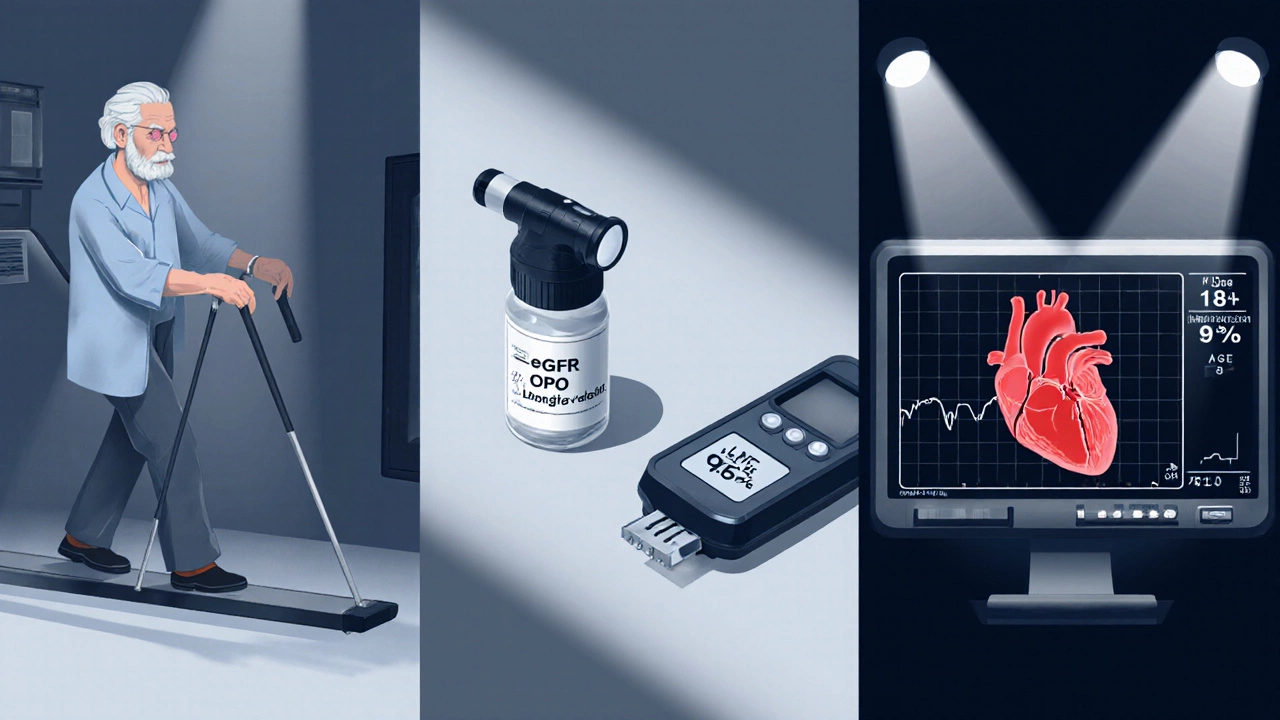
Heart Surgery Risk Assessment Tool
High Risk Factors
- 1. Advanced age (>80 years) with frailty
- 2. Severe kidney disease (stage 4-5)
- 3. Severe COPD
- 4. Uncontrolled diabetes
- 5. Severe liver disease
Moderate Risk Factors
- 1. Moderate frailty
- 2. Mild to moderate kidney disease
- 3. Active cancer
- 4. Very low ejection fraction
- 5. History of stroke or heart attack
Deciding whether to go under the knife for a heart problem is never easy. While many patients benefit from a life‑saving operation, a handful of health profiles simply make the risk outweigh the reward. Below we break down who falls into that group, why doctors say “no,” and what you can do instead.
What Exactly Is Heart Surgery?
Heart surgery is a set of invasive procedures that correct structural problems of the heart, such as blocked arteries, leaky valves, or damaged muscle tissue. Common types include coronary artery bypass graft (CABG), valve repair or replacement, and heart transplantation. The goal is to restore blood flow or improve the heart’s pumping ability, often extending both quantity and quality of life.
Why Some Patients Aren’t Good Candidates
Surgeons run a detailed risk‑benefit analysis before they ever pick up a scalpel. Certain medical and lifestyle factors consistently flag patients as high‑risk, meaning the chance of serious complications or a poor outcome is unacceptably high.
Advanced Age and Frailty
Age alone isn’t a disqualifier, but when age combines with frailty, the odds shift dramatically. Frailty-a syndrome marked by weakness, slowed walking speed, and low muscle strength-predicts poor wound healing, longer intensive‑care stays, and higher mortality. Studies from the American College of Cardiology show that patients over 80 with a frailty score above 3 have a 30% higher post‑operative death rate compared with sturdier peers.
Severe Comorbidities
- Chronic kidney disease (stage4‑5) limits the body’s ability to clear anesthetic drugs and predisposes to fluid overload.
- Chronic obstructive pulmonary disease (COPD) reduces oxygen reserves, making it harder to wean patients off ventilators after surgery.
- Uncontrolled diabetes (HbA1c>9%) leads to higher infection rates and delayed sternal healing.
- Severe liver cirrhosis (Child‑Pugh classC) impairs clotting and drug metabolism.
- Active cancer undergoing chemotherapy, because the immune system is already compromised.
When any of these conditions are present, surgeons often recommend medical management or less‑invasive alternatives.
Cardiac Conditions That Lower Success
- Extremely low left ventricular ejection fraction (LVEF<20%). The heart’s pump is so weak that adding the stress of surgery may trigger heart failure.
- Massive calcification of the aortic root, which makes a safe valve replacement practically impossible.
- Extensive multivessel disease where all coronary arteries are diffusely blocked; sometimes the risk of incomplete revascularization outweighs benefits.
Lifestyle and Behavioral Risks
Smoking within the last 30days dramatically raises the risk of sternal wound infection-up to three times higher than in non‑smokers. Substance abuse (e.g., heavy alcohol use or illicit drugs) interferes with anesthesia and postoperative care compliance. Finally, patients who cannot commit to the necessary lifestyle changes-like strict medication adherence, diet, and activity-are often steered away from surgery because the long‑term benefits would be lost.

How Doctors Decide: The Evaluation Process
When you walk into a cardiac clinic, the team doesn’t rely on gut feeling alone. They run a battery of tests and scoring tools to quantify risk.
- Detailed medical history and physical exam, focusing on the factors listed above.
- Blood work to gauge kidney function, liver enzymes, blood sugar, and coagulation status.
- Imaging studies-echocardiogram, coronary CT, or angiography-to map heart structure and blood flow.
- Risk calculators such as EuroSCORE II, which predicts 30‑day mortality based on age, LVEF, renal function, and more. A score above 6% typically signals high operative risk.
- Functional assessment, like a six‑minute walk test, to gauge frailty and overall endurance.
The surgeon then discusses the numbers with you, outlining why you may or may not be a viable heart surgery candidates and what alternatives exist.
Alternatives for Those Not Ideal for Surgery
Being turned down for an operation isn’t the end of the road. Modern cardiology offers several less‑invasive options that can still improve symptoms and outlook.
- Percutaneous coronary intervention (PCI) - a catheter‑based technique to open blocked arteries with a stent, useful for patients who can’t tolerate sternotomies.
- Transcatheter aortic valve replacement (TAVR) - replaces a diseased aortic valve via a small groin incision, a game‑changer for high‑risk older adults.
- Optimized medical therapy - anti‑platelet drugs, statins, beta‑blockers, and lifestyle counseling tailored to your condition.
- Cardiac rehabilitation - supervised exercise and education programs that lower mortality by up to 30% even without surgery.
- Clinical trial enrollment - experimental devices or drug regimens that may become future standards of care.
Quick Self‑Assessment Checklist
Before your next appointment, ask yourself these questions. A “yes” to several items suggests you’ll need a thorough risk discussion.
- Am I over 80years old and feel unusually weak or slow?
- Do I have stage4 kidney disease, severe COPD, or uncontrolled diabetes?
- Is my heart’s ejection fraction below 20%?
- Did I smoke cigarettes within the last month or use heavy alcohol?
- Can I commit to taking medicines every day, eating heart‑healthy, and exercising regularly?
If you ticked off more than one, bring this list to your cardiologist. It will help them explain why surgery might pose too much danger and which alternative pathways fit your life.

Good Candidate vs. Not‑Good Candidate: A Side‑by‑Side Look
| Attribute | Good Candidate | Not‑Good Candidate |
|---|---|---|
| Age | 55‑75, low frailty score | >80 with frailty or severe sarcopenia |
| Kidney Function | eGFR>60mL/min/1.73m² | eGFR<30mL/min/1.73m² (stage4‑5 CKD) |
| Lung Health | FEV1>70% predicted | Severe COPD, FEV1<50% |
| Diabetes Control | HbA1c<8% | HbA1c>9% or frequent hypoglycemia |
| Cardiac Function | LVEF≥35% | LVEF<20% |
| Smoking Status | Non‑smoker or quit >6months | Current smoker (≤30days) |
| Compliance | Willing to follow meds, diet, rehab | Unreliable medication adherence |
Next Steps After Learning You’re Not Ideal for Surgery
1. **Schedule a detailed consult** with your cardiologist to review the risk scores. 2. **Ask about minimally invasive options**-they may be safer and still effective. 3. **Enroll in a cardiac rehab program**; even modest exercise can boost heart function. 4. **Get a second opinion** if you feel uncomfortable with the assessment. 5. **Implement lifestyle changes** immediately-quit smoking, control blood sugar, and adopt a Mediterranean‑style diet.
Remember, the goal isn’t to avoid treatment; it’s to choose the right treatment for your unique health picture.
Frequently Asked Questions
Can age alone stop me from having heart surgery?
Age is one piece of the puzzle. A healthy 78‑year‑old without frailty can be a good candidate, while an 65‑year‑old with severe frailty may not. Doctors look at functional status, organ health, and overall risk rather than the number alone.
What is the EuroSCORE II and why does it matter?
EuroSCORE II is a calculator that predicts the chance of death within 30days after cardiac surgery. It uses variables like age, kidney function, LVEF, and emergency status. A score above 6% flags high operative risk, prompting doctors to consider alternatives.
If I’m a smoker, how long should I quit before surgery?
Ideally, stop at least 6weeks before the operation. This gives lung tissue time to recover, lowering the risk of wound infection and respiratory complications.
Are there insurance hurdles for non‑surgical options?
Most insurers cover PCI, TAVR, and cardiac rehab when they’re medically justified. However, pre‑authorization often requires documentation of why surgery isn’t safe, so having a clear risk‑assessment report helps.
Can lifestyle changes make me a better surgical candidate later?
Absolutely. Improving nutrition, quitting smoking, controlling blood sugar, and building strength through supervised exercise can lower frailty scores and improve organ function, potentially moving you into a safer risk bracket.

Write a comment